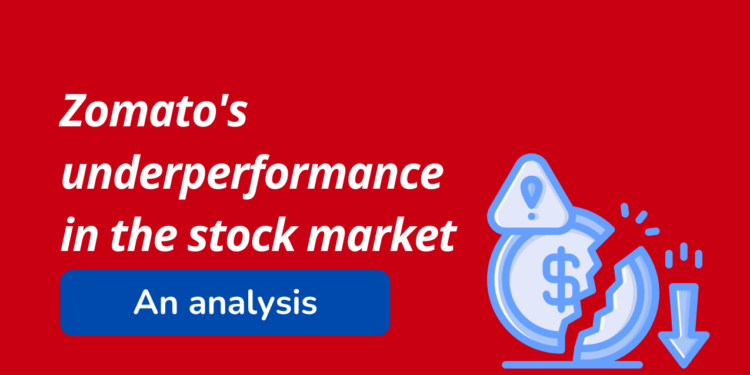The shares of Zomato are on a nosedive in the last few days along with other startups like Paytm and Nykaa that were listed last year. These stocks are losing attractiveness because the institutional investors – Foreign as well as domestic – are trimming their portfolio from the new-age companies.
Zomato was listed at 126 rupees per share and currently it is trading at around 72 rupees, a loss of 43 percent to those invested. The other companies like Paytm and Nykaa are meeting the same fate, although Nykaa is still better than the others given that it is a profit-making venture.
The investors no longer trust the business model of loss-making startups which spent billions of dollars on advertisement rather than on improving products. The internet companies like Zomato, Swiggy, Paytm, Byju’s, and Unacademy are spending more money on advertisements and this is leading to customer dissatisfaction.
Many of these companies are losing customers as penetration has reached saturation point. Moreover, they have no idea of how they will make profits and become a good investment for investors.
The institutional investors are losing trust in these companies. The big daddys of the stock market like Radha Kishan Damani or Rakesh Jhunjhunwala already suggested that the investors should stay away from these stocks. Now the mutual funds or hedge funds that put money in these stocks are exiting and retail investors are also following them.
“I don’t like companies which do not make a profit, because I like valuing companies as a multiple of profit,” says Nikhil Kamath, the co-founder of True Beacon and Zerodha.
“The ecosystem constantly changes, there are new competitors and none of these companies have a really big moat. So I would remain skeptical even at the current valuations,” Nikhil Kamath added.
Nykaa IPO came in at a price band of ₹ 1085-1125 per share in October last year, the stock hit a high of Rs 2,573 within weeks of listing. Since then, Nykaa’s share price has fallen to now trade at ₹ 1,675 apiece. Zomato launched its IPO at ₹ 72-76 per share in July 2021. The stock soared to hit a high of ₹ 169 per share and now trades at ₹ 78 per share. One 97 Communications, the parent of Paytm launched its IPO in November 2021 at a price band of ₹ 2080-2150 per share. The stock opened at a discount and has never traded at its IPO price. Today Paytm share opened for trade at ₹ 610 per share.
As long as you are using the money of venture capitalists or big-ticket investors to survive in cut-throat competition, it is alright. You can keep your investors with the promise of earning big profits in the distant future. But when a company goes public, it has to open itself to the scrutiny of its financial records.
You can no longer burn a lot of cash in a bid to keep your consumer base intact. This is what has happened with Zomato already and this is what can happen with Swiggy too. And once, such companies have to give up aggressive consumer-acquiring policies, a third giant can come in and steal their loyal consumer base without going public.
While it is good to see record retail participation and massive democratization of stock markets, the retail investors must not fall for the media hype and play on the safer side by investing in profit-making established companies and letting the institutional investors take the fall in new listings and their crazy valuations.
So, as and when, Swiggy does launch its IPO, retail investors should imply opt not to invest. They could start looking for businesses with better fundamentals like electric battery startups or companies investing in renewables. This is what smart investors do- they don’t fall for the big names, rather they look for businesses that can actually give them good returns.
























